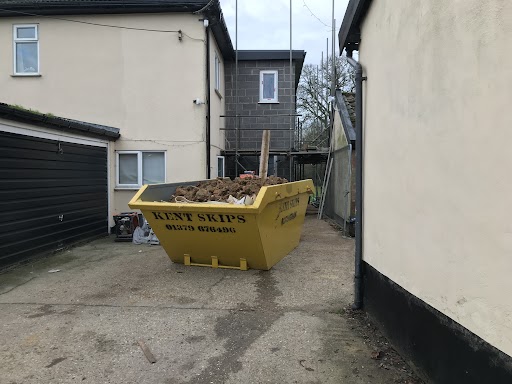Top Tips for Efficient Waste Management During Home Renovations in Norwich
Home renovations can be incredibly rewarding, transforming your living space into something truly special. However, we’ve learnt through experience that one of the most overlooked aspects of any renovation project is proper waste management. Having worked with countless homeowners across Norfolk and Suffolk, we understand the challenges that come with disposing of renovation waste efficiently and responsibly.
Understanding Your Renovation Waste Types
When we first started in the waste management industry with Kent Skips back in 1952, renovation projects were simpler affairs. Today’s home improvements generate a much more diverse range of waste materials, each requiring different disposal methods.
Construction and Demolition Debris
The bulk of your renovation waste will likely consist of construction materials such as old plasterboard, timber offcuts, bricks, and concrete. These materials are generally straightforward to dispose of, but proper segregation makes an enormous difference to recycling rates. At Kent Skips, we’re proud to recycle approximately 85% of the waste we collect, but this impressive figure relies heavily on homeowners taking the time to separate materials correctly.
We always recommend keeping timber separate from masonry materials when possible. Clean timber can often be recycled into chipboard or biomass fuel, whilst concrete and bricks can be crushed and reused in new construction projects. This segregation doesn’t just benefit the environment – it can also help reduce your disposal costs.
Hazardous Materials Requiring Special Attention
Renovation projects often uncover materials that require special handling. Asbestos, commonly found in homes built before 1980, must never be placed in a standard skip. If you suspect asbestos is present, we strongly advise stopping work immediately and consulting with licensed professionals.
Paint tins, solvents, and chemical-based products also fall into the hazardous category. These items can contaminate entire skip loads if not handled properly, making recycling impossible and increasing disposal costs significantly. Many local councils in Norfolk provide hazardous waste collection services, which we recommend utilising for these specific materials.
Choosing the Right Skip Size for Your Project
One of the most common mistakes we encounter is homeowners either overestimating or underestimating their skip requirements. Getting this right from the start saves both money and hassle.
Mini Skips for Smaller Projects
For bathroom renovations or single-room projects, our 2-yard mini skips are often perfectly adequate. These compact skips can handle approximately 20-25 black bin bags worth of waste, making them ideal for projects involving mainly lightweight materials like old fixtures, fittings, and decorative elements.
Mid-Range Options for Comprehensive Renovations
Kitchen renovations and multi-room projects typically require 6-yard or 8-yard skips. These sizes accommodate heavier materials like old kitchen units, appliances, and substantial amounts of plasterboard whilst remaining manageable for most driveways.
Large Skips for Major Overhauls
Complete house renovations or projects involving structural changes often necessitate our larger 12-yard to 20-yard skips. For commercial-scale projects, we offer roll-on/roll-off skips up to 40 yards, though these are rarely needed for domestic renovations.
Maximising Recycling Opportunities
Effective waste segregation begins before your skip arrives. We recommend setting up separate areas in your workspace for different material types, making it easier to load efficiently when your skip is delivered.
Metals and Valuable Materials
Copper piping, old radiators, and steel fixtures have significant scrap value. Rather than mixing these with general waste, consider setting them aside. Many scrap metal dealers will collect these materials free of charge, and some even pay for certain types. This approach reduces your skip volume requirements whilst providing a small financial return.
Salvageable Building Materials
Quality materials like hardwood flooring, period features, and architectural salvage items might have value to other renovators. Online marketplaces and local architectural salvage yards often welcome these materials, giving them a second life whilst reducing your disposal requirements.
Timing Your Skip Hire Strategically
Proper timing can significantly impact both project efficiency and costs. We’ve found that many homeowners benefit from our flexible hire periods, which allow skips to remain on-site for extended periods without penalty.
The Load & Go Option
For projects with unpredictable waste generation patterns, our Load & Go service provides excellent flexibility. This option allows you to call for collection once your skip reaches capacity, rather than committing to specific collection dates. This approach works particularly well for renovation projects where waste generation varies significantly from day to day.
Planning Around Project Phases
Different renovation phases generate different waste types and volumes. Demolition phases typically produce large volumes of heavy materials quickly, whilst finishing phases generate smaller amounts of diverse waste over longer periods. Planning your skip requirements around these phases ensures you’re never left without adequate disposal capacity.
Working Within Norwich Regulations
Local authorities in Norwich and surrounding Norfolk areas have specific requirements for skip placement and waste types. Skips placed on public highways require permits, which we can arrange through our comprehensive service offering at Kent Skips.
We always advise homeowners to consider their neighbours when positioning skips. Blocking access or creating safety hazards can lead to complaints and potential fines. Where possible, positioning skips on private property eliminates permit requirements and provides greater flexibility.
Conclusion
Effective waste management during home renovations requires planning, proper segregation, and choosing the right disposal partner. With over 70 years of experience serving South Norfolk and North Suffolk, we’ve seen how proper waste management can transform renovation projects from stressful undertakings into smooth, environmentally responsible improvements.
Whether you’re planning a small bathroom update or a complete home transformation, taking time to plan your waste management strategy will save you time, money, and environmental impact. Remember, every piece of waste we can divert from landfill through proper recycling makes a difference to our local environment and future generations.


